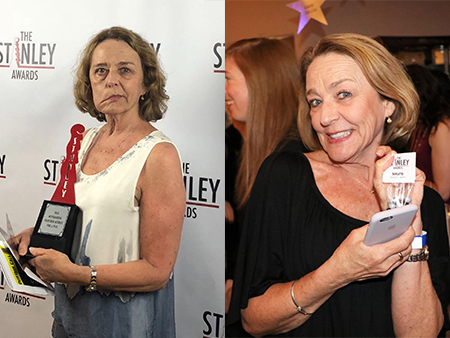Media Contact: Adam Pope
 EDITOR’S NOTE: This article was written pre-COVID-19. All patient care experiences mentioned in this article do not reflect the current care guidelines.
EDITOR’S NOTE: This article was written pre-COVID-19. All patient care experiences mentioned in this article do not reflect the current care guidelines.
Mary Ellen Killen, a native of Killen, Alabama, has been performing in community theater for more than 30 years.
“It never occurred to me that the last one I did could have been my last,” Killen said.
She started noticing hearing loss in her right ear and tingling on the right side of her face.
“I thought, ‘I’m just getting older. These things just happen.’”
Killen’s symptoms were getting worse. She was feeling dizzy and light-headed and just could not shake it. It was time to figure out what was wrong. She went to a local ENT, who could not pinpoint why these things were happening.
“They were sending me out of there with motion sickness medicine,” she said. “I told the doctor, ‘I am not an alarmist. I’ve been dealing with this for years. It’s progressively worse. I wouldn’t be surprised if it is a tumor. I need an MRI.’”
The next day, Killen got an MRI. She was diagnosed with an acoustic neuroma, a rare non-cancerous tumor that develops on the balance, hearing or auditory nerves leading from your ear to your brain. The pressure on the nerve from the tumor was causing her hearing loss and imbalance.
“The tumor was huge,” Killen said. “The doctors said a large one is 2 centimeters. It was over 4.”
While finding out about the tumor, Killen was still practicing lines for a lead role in an upcoming play, “The Curious Savage.”
“I did that play so dizzy. When we took our bows, both actors on each side of me had to hold me up,” she said.
Once the play was over, Killen underwent a 10-hour surgery to remove the acoustic neuroma. The surgical approach often causes facial nerve damage, leaving a patient with complete or partial paralysis.
“I never realized I would have complete paralysis on that side of my face,” Killen said. “I couldn’t move my face. The right side of my lips had no feeling, so it was hard to eat. My eye wouldn’t close, so I had to sleep with a patch.”
A few months after the surgery, Killen found out she had won Most Outstanding Featured Actress in the Shoals area for her performance in “The Curious Savage.” She was invited to accept the award in front of a packed house.
“My face was so messed up. Half of it was drooping down. I’m looking back at the pictures like, ‘How did I get up in front of 700 people looking like that?’”
After seeing pictures from the award ceremony, Killen was determined to find a solution. That is when she found the University of Alabama at Birmingham Facial Nerve Clinic. Benjamin Greene, M.D., a microvascular reconstructive surgeon in the Department of Otolaryngology, developed a comprehensive treatment plan for Killen to improve her facial function and restore her smile.
“The nerve to Mrs. Killen’s masseter, a muscle that runs from the lower jaw to the rear part of the cheek, was not injured in her acoustic neuroma surgery,” Greene said. “Since it was not damaged, we were able to perform a nerve transposition procedure, where the nerve to the masseter is moved over and sewn to branches of her facial nerve.”
Greene said this would give her a more functional smile, as well as better resting symmetry.
“When he explained the surgery to me, I jumped on it,” Killen said. “I knew, if I wanted to do theater and just be me again, it was worth a shot.”
Just three months after the nerve transposition surgery, she started to regain muscle control.
“I was so excited,” she said. “I remember saying to my husband, ‘Oh my gosh! Look! I almost have two dimples again!’”
Killen continued her treatment plan that included a brow lift, upper eyelid weight placement and lower eyelid tightening. These in-office procedures were done just in time to present the Most Outstanding Featured Actress award to the latest recipient. Killen says she now has the confidence to get back on stage and do what she loves — act.
“I can’t say enough about Dr. Greene and everyone at the Facial Nerve Clinic,” Killen said. “The transformation from complete paralysis to now has been amazing.”
The UAB Department of Otolaryngology and Division of Plastic Surgery operate the first and only facial nerve clinic in the state of Alabama. The UAB Facial Nerve Clinic offers expertise in treatment of facial nerve disorders, including treatment of facial nerve paralysis, facial nerve weakness following trauma or cancer treatment, Bell’s palsy, or congenital facial nerve disorders. The clinic offers a wide range of surgical and non-surgical options from their team of microvascular surgeons, physicians, radiologists, advanced practice providers, therapists and nurses.